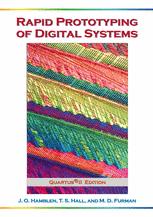

Most ebook files are in PDF format, so you can easily read them using various software such as Foxit Reader or directly on the Google Chrome browser.
Some ebook files are released by publishers in other formats such as .awz, .mobi, .epub, .fb2, etc. You may need to install specific software to read these formats on mobile/PC, such as Calibre.
Please read the tutorial at this link: https://ebookbell.com/faq
We offer FREE conversion to the popular formats you request; however, this may take some time. Therefore, right after payment, please email us, and we will try to provide the service as quickly as possible.
For some exceptional file formats or broken links (if any), please refrain from opening any disputes. Instead, email us first, and we will try to assist within a maximum of 6 hours.
EbookBell Team

4.0
46 reviewsRapid Prototyping of Digital Systems: Quartus II Edition provides an exciting and challenging laboratory component for undergraduate digital logic and computer design courses using FPGAs and CAD tools for simulation and hardware implementation. The more advanced topics and exercises also make this text useful for upper level courses in digital logic, programmable logic, and embedded systems. This new version of the widely used Rapid Prototyping of Digital Systems, Second Edition, now uses Altera's new Quartus II CAD tool and includes laboratory projects for Altera's UP 2 and the new UP 3 FPGA board.
Rapid Prototyping of Digital Systems: Quartus II Edition includes four tutorials on the Altera Quartus II and NIOS II tool environment, an overview of programmable logic, and IP cores with several easy-to-use input and output functions. These features were developed to help students get started quickly. Early design examples use schematic capture and IP cores developed for the Altera UP FPGA boards. VHDL is used for more complex designs after a short introduction to VHDL-based synthesis. New to this edition is an overview of System-on-a-Programmable Chip (SOPC) technology and SOPC design examples for the UP3 using Altera's new NIOS II Processor hardware and C software development tools.